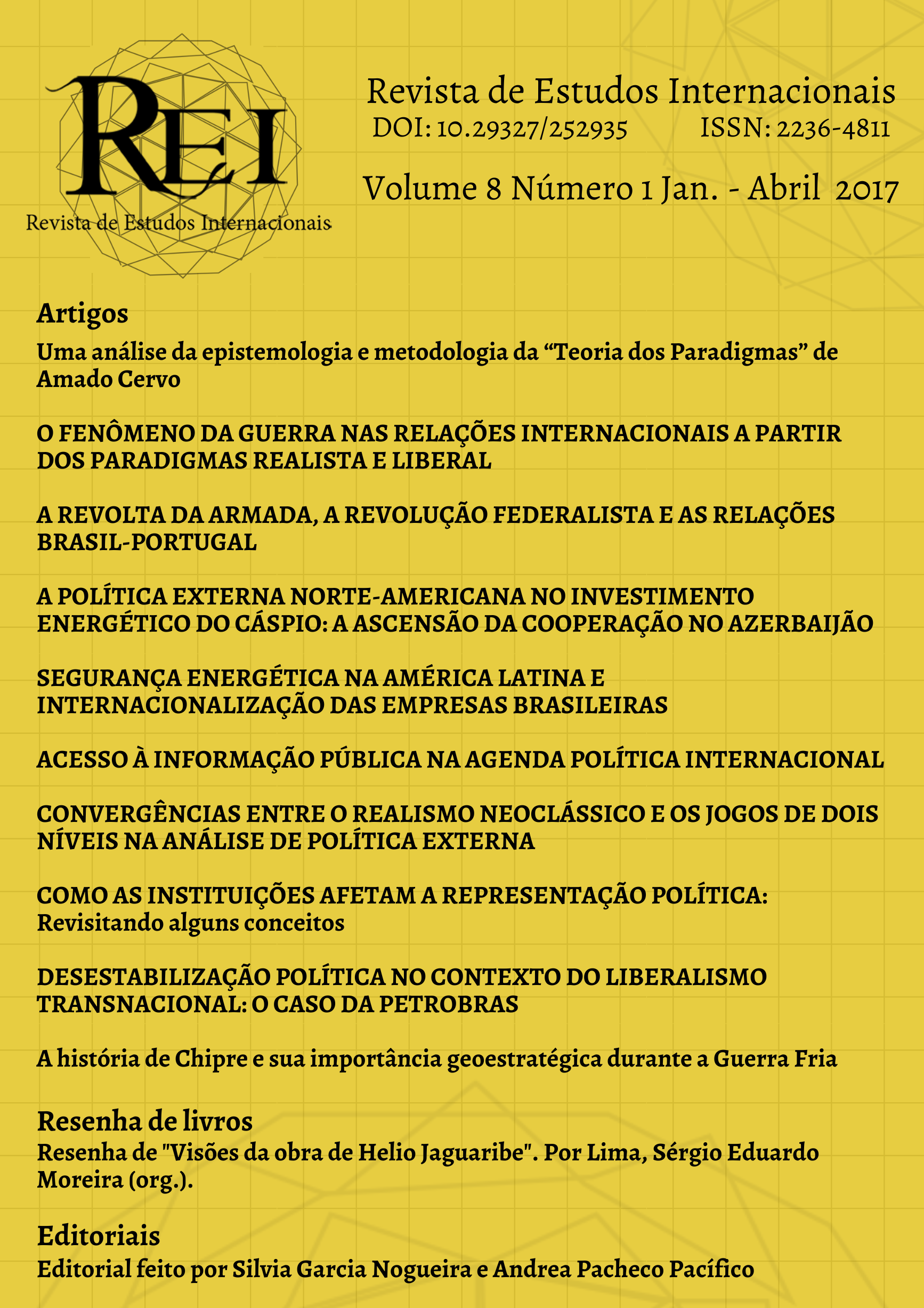A POLÍTICA EXTERNA NORTE-AMERICANA NO INVESTIMENTO ENERGÉTICO DO CÁSPIO: A ASCENSÃO DA COOPERAÇÃO NO AZERBAIJÃO
Palavras-chave:
Cáucaso, Políticas energéticas do Cáspio, Política externa norte-americanaResumo
Este artigo apresenta o entendimento de como os EUA são percebidos como um ator não dominante, mas influente, em um modelo de cooperação promissor na política energética no Azerbaijão, baseando-se no pressuposto de que sua influência política tem natureza em grande parte integracionista e estratégica, com o objetivo de expandir rotas de transporte de energia para o benefício da comunidade internacional.
Referências
BLANK, Stephen (2013). Azerbaijan’s Security and U.S Interests: Time for a Reassessment. Silk
Road Paper. Washington: Central Asia-Caucasus Institute Silk Road Studies Program.
BUZAN, Barry et al. (1998). Security: A New Framework for Analysis. Londres: Lynne Rienner
Pub.
CHANG, Felix K. (2014). Friends in Need: Geopolitics of China-Russia Energy Relations,
publicado em Foreign Policy Research Institute [http://www.fpri.org/articles/2014/05/friends-needgeopolitics-china-russia-energy-relations]. Disponibilidade: 22/05/ 2014.
CHUFRIN, Gennady (2004). The Energy Dimension in Russian Global Strategy: Russian’s
Caspian Energy Policy and its Impact on the U.S.-Russian Relationship, publicado em James a.
Baker III Institute for Public Policy of Rice University [http://www.bakerinstitute.org/files/2733].
Disponibilidade: 23/05/ 2014.
FREIRE, Maria R. (2007). Triangulating Power: Russia, Europe and the United States Security
Policies and Interests Projection in a Globalizing World. In STIVACHTIS, Yannis A. (ed.)
International Order in a Globalizing World. Aldershot: Ashgate, 65-84.
FREIRE, Maria R.; KANET, Roger E. (2010). Key Players and Regional Dynamics in Eurasia:
the return of the ‘great game’. Londres: Palgrave Macmillan.
JAFFE, Amy M.; SOLIGO, Ronald (2004). Re-evaluating US strategic priorities in the Caspian
Region: balancing energy resource initiatives with terrorism containment. Cambridge Review of
International Affairs, 17 (2): 255-268.
KAY, Sean (2006). Global Security in the Twenty-first Century: The Quest for Power and the
Search for Peace. Lanham: Rowman & Littlefield Pubs.
KEOHANE, Robert (1984) After Hegemony: Cooperation and Discord in the World Political
Economy. New Jersey: Princeton University Press.
LADAA, Munir (2005). Transboundary Issues on the Caspian Sea: Opportunities for
Cooperation, publicado em Bonn International Center for Conversion, Paper 47
[http://www.bicc.de/uploads/tx_bicctools/paper47.pdf]. Disponibilidade: 21/04/ 2014.
MAREK, Larry T. (2007). The Caspian Sea Pipeline: A Clear Strategic U.S. Interest, publicado
em United States Army Military Intelligence [handle.dtic.mil/100.2/ADA471547]. Disponibilidade:
/04/ 2014.
NASSIROV, Elshad (2014). Azerbaijan aims to boost EU’s gas supply, publicado em CNN
Edition: International [http://edition.cnn.com/video/data/2.0/video/bestoftv/2014/05/01/exp-socarselshad-nassirov.cnn.html] Disponibilidade: 03/05/ 2014.
NICHOL, Jim (2013). Azerbaijan: Recent Developments and US Interests, publicado em CRS
Report for Congress [https://www.fas.org/sgp/crs/row/97-522.pdf]. Disponibilidade: 11/04/ 2014.
______. (2014) Armenia, Azerbaijan and Georgia: Political Developments and Implications for
U.S. Interests. Congressional Research Service Reports, 8: 8-37.
OKTAV, Ozden Z. (2005). American Policies towards the Caspian Sea and the Baku-TbilisiCeyhan pipeline. Perceptions, Spring Issue: 17-34.
OSKANIAN, Kevork (2013). Fear, Weakness and Power in the Post-Soviet South Caucasus: a
theoretical and empirical analysis. Basingstoke: Palgrave Mcmillan.
ÖZKAN, Güner (2006). Economic and Security Values of Caspian Energy for Azerbaijan. Review
of International Law and Politics (RILP - UHP), 2 (6): 58-76.
RUBIN, Vadim (1999). The Geopolitics of Energy Development in the Caspian Region:
Regional Cooperation or Conflict?, publicado em Center for International Security and Cooperation
[http://iis-db.stanford.edu/pubs/10337/caspian.pdf]. Disponibilidade: 10/04/ 2014.
SULAIMAN, Sadia (2001). U.S. Policy in Oil Rich Caspian Basin. Islamabad: Institute of
Strategic Studies.
TRINDLE, Jamila (2014). Gas Deal Could Complicate Sanctions Threat Against Russia,
publicado em The Cable for Foreign Policy
[http://thecable.foreignpolicy.com/posts/2014/05/21/gas_deal_could_complicate_sanctions_threat_a
gainst_russia]. Disponibilidade: 22/05/ 2014.
UNCTAD. World Investment Report, (2000) Cross-Border Mergers and Acquisitions and
Development, New York e Geneve: United Nations.
U.S DEPARTMENT OF ENERGY (2001). Reliable, Affordable, and Environmentally Sound
Energy for America’s Future, publicado em Cheney Report of the National Energy Development
Policy Group, May [http://www.wtrg.com/EnergyReport/National-Energy-Policy.pdf]
Disponibilidade: 30/04/ 2014.
U.S. DEPARTMENT OF ENERGY (2013). Annual Energy Outlook.. Washington D.C.: U.S
Energy Information Administration/ US Department of Energy.
VELIYEV, Ceyhun (2011). U.S. foreign policy towards Azerbaijan, publicado em The
Washington Review of Turkish and Eurasian Affairs
[http://www.thewashingtonreview.org/articles/us-foreign-policy-toward-azerbaijan.html].
Disponibilidade: 20/04/ 2014.
WELT, Cory (2006). Azerbaijan and U.S. Foreign Policy, publicado em Center for Strategic and
International Studies Briefing [https://csis-prod.s3.amazonaws.com/s3fspublic/legacy_files/files/media/csis/pubs/060426_ruseura_reccommcwelt.pdf]. Disponibilidade:
/04/ 2014.


